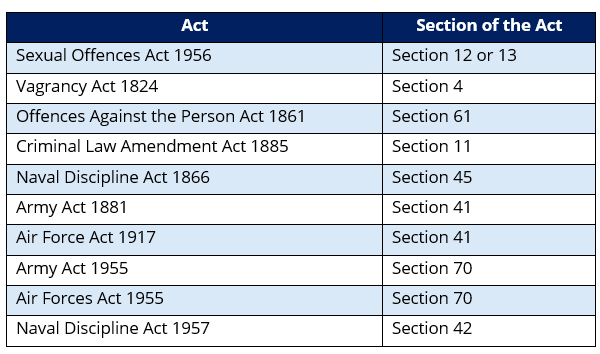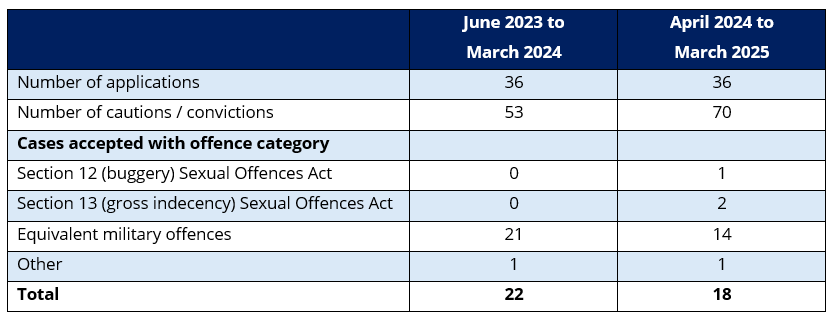Aim of this page
In January 2017, the Justice Secretary announced that thousands of gay and bisexual men convicted of sexual offences which have now been decriminalised would be posthumously pardoned. This builds on an earlier scheme that was introduced in 2012 to ‘disregard’ decriminalised sexual offences.
This page provides further information about the disregard process, which is the process that individuals have to go through.
Why is this important?
Years ago, many people were convicted of offences which are no longer illegal today. Things changed when the Sexual Offences Act 1967 came into force which decriminalised private homosexual acts between men over the age of 21 in England and Wales.
However, if you were convicted of a sexual offence which has now been decriminalised, you may find that this conviction will still appear on a formal criminal record check unless you have applied to have it disregarded.
Unfortunately, you have to proactively apply for a disregard – it doesn’t happen automatically. Many people won’t realise they have a historic offence on their record until it’s disclosed on a DBS check – at which point the damage may already be done.
Many employers have little understanding of legal definitions, and so you may find yourself being refused an interview or job on the basis of being convicted of an offence that is no longer illegal.
Introduction
The coalition government made a commitment in 2010 to change the law so that historical convictions for consensual gay sex with over 16s would not show up on criminal records checks.
The Disregards and Pardons Scheme came into force on 1 October 2012. Under the provisions of Chapter 4 of Part 5 of the Protection of Freedoms Act 2012 (s.92-101), the Home Secretary may ‘disregard’ certain convictions (which includes cautions, warnings and reprimands) for decriminalised consensual sex offences.
Under the disregard provisions, individuals can apply to the Home Secretary for a formal disregard of their convictions. If the Home Secretary considers that a disregard is appropriate, those convictions disregarded will be deleted or annotated. They will no longer be disclosed in certificates issued by the Disclosure and Barring Service.
Eligibility
The offences that criminalised consensual sex between men over the age of consent were mainly sections 12 (buggery) and 13 (gross indecency) of the Sexual Offences Act (SOA) 1956.
The following offences are covered by the process:

People charged under these laws will only be able to have them disregarded if two key conditions are satisfied:
- The activity must have been consensual – All parties involved in the conduct constituting the offence consented to it and were aged 16 or over at the time of the offence
- It must not be an offence today – The scheme does not include sexual activity in a public lavatory (which is still illegal)
How to apply
The application form and guidance notes for applicants are available to download from GOV.UK.
The process is free of charge.
What happens next?
- If your application is not eligible to be disregarded you will receive a letter to that effect. In all other cases you will receive an acknowledgement that your application has been received and is being processed.
- The Home Office will then contact all relevant data controllers and request them to review their records and provide copies of any relevant documents to the Home Secretary to enable a decision to be made.
- Once the Home Secretary has made a decision, you will be informed of the outcome. If your application is successful, the Home Secretary will write to the relevant data controllers and require them to delete or annotate their records accordingly.
What is the effect of the disregard?
Once the Home Secretary has given notice that a conviction has been disregarded and a period of 14 days thereafter has elapsed, a successful applicant will be treated in all circumstances as though the offence had never occurred and need not be disclosed for any purpose. It means, in effect, that it’s deleted.
Those successful in the disregard process are then also pardoned by the government.
What if you disagree with the Home Secretary’s decision?
If you disagree with the decision made by the Home Secretary and either have further evidence to submit or consider that an error was made on your initial application form, you should contact the Home Office so that your application can be reviewed. If you consider that the final decision reached in relation to your application is wrong, you have the right under the provisions of the Protection of Freedoms Act 2012 to seek leave to appeal the decision to the High Court.
How many people have had their offences disregarded?
Latest figures from the Home Office show that between June 2023 and March 2025, the number of cases dealt with was 72. This is broken down as follows:
Eligible applications

Ineligible applications

Update
The Government’s 2012 Disregards and Pardons Scheme was expanded in 2023 to include women and more former military personnel affected by the pre-2000 ban on LGBT+ and service members.
Since the expansion, 40 people have been given pardons, with the majority granted to former military personnel.
Discuss this with others
Read and share your experience on our online forum.
Key sections include:
Useful links
Below you will find links to useful websites relating to this page. More specific details (including addresses and telephone numbers) of some of the organisations listed below can be found here.
- Home Office – The Home Office is the government department responsible for the disregard process. You can contact them by emailing chapter4applications@homeoffice.gsi.gov.uk or writing to Chapter 4 Applications, Safeguarding Directorate, 5th Floor, Fry Building, 2 Marsham Street, London, SW1P 4DF.
- Ministry of Justice – A government body who have responsibility for the Rehabilitation of Offenders Act.
- Stonewall – A lesbian, gay and bisexual charity who have produced a fantastic guide about who’s eligible and how to apply.
- Galop – An LGBT charity, have also produced a really useful guide in partnership with Bindmans Solicitors.
More information
- To discuss this issue with others – Read and share your experiences on our online forum
- Questions – If you have any questions about this, you can contact our helpline.
This page was last fully reviewed and updated in June 2025. If you’ve spotted something that needs updating, please let us know by emailing details to advice@unlock.org.uk.

Comments
Add Comment